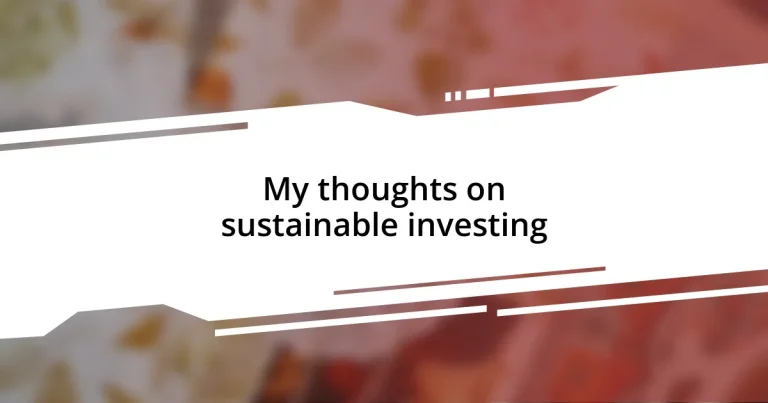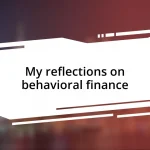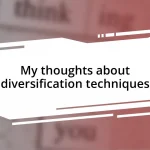Key takeaways:
- Sustainable investing aligns financial goals with personal values, focusing on social responsibility and environmental stewardship.
- Companies with strong sustainability practices often enjoy enhanced reputation, customer loyalty, and long-term stability.
- Investors face challenges such as lack of standardized ESG metrics and the risk of greenwashing, necessitating thorough research and engagement.
- The future of sustainable investing is moving towards technology-driven solutions, AI integration, and socially responsible funds that promote inclusivity.
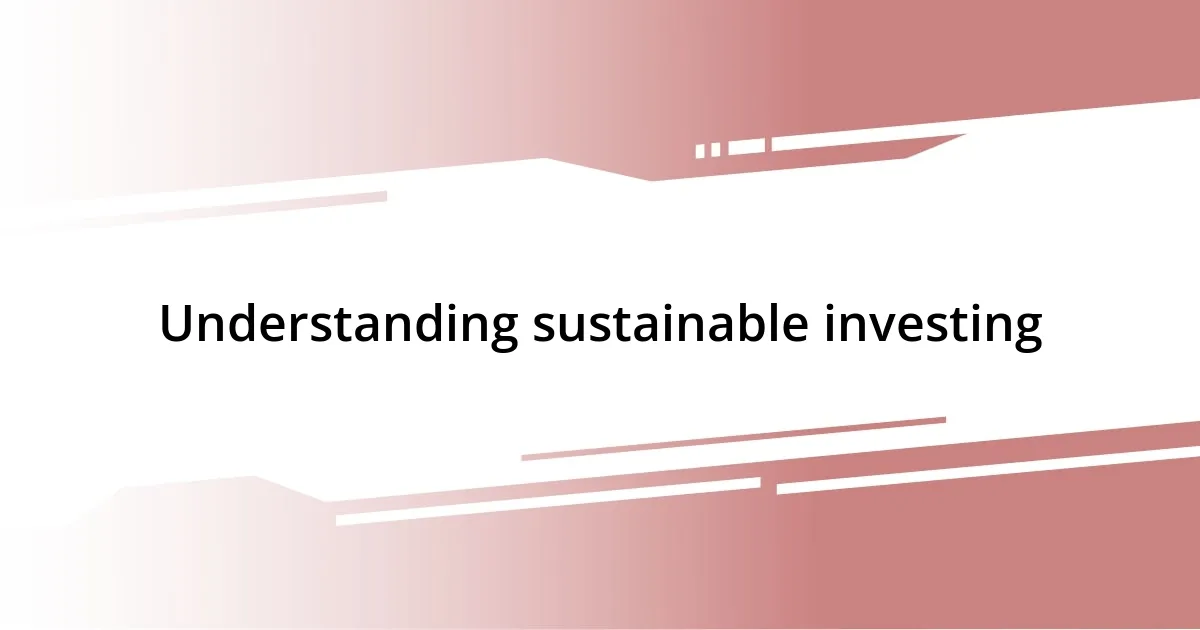
Understanding sustainable investing
Sustainable investing is fundamentally about aligning your financial goals with your values. I remember when I first learned about it; I was struck by the idea that my investments could reflect my commitment to social responsibility and environmental stewardship. Does it make sense to invest in companies that harm the planet, even if they offer high returns? Personally, I couldn’t reconcile that.
It’s fascinating how many people still see investing purely as a numbers game. Yet, when I began to look at companies through the lens of their sustainability practices, it added a whole new layer to my investment strategy. Evaluating a firm’s environmental, social, and governance (ESG) metrics opened my eyes, and I started to realize that companies dedicated to sustainability often exhibited long-term stability. Who wouldn’t want to be part of a financial ecosystem that prioritizes a better world?
Moreover, sustainable investing isn’t just about avoiding bad practices; it’s also about actively seeking out good ones. I recall feeling empowered when I chose to invest in a renewable energy firm that not only promised growth but also contributed positively to society. That sense of purpose made my financial commitment more meaningful. Isn’t it fulfilling to know your investments are making a difference?
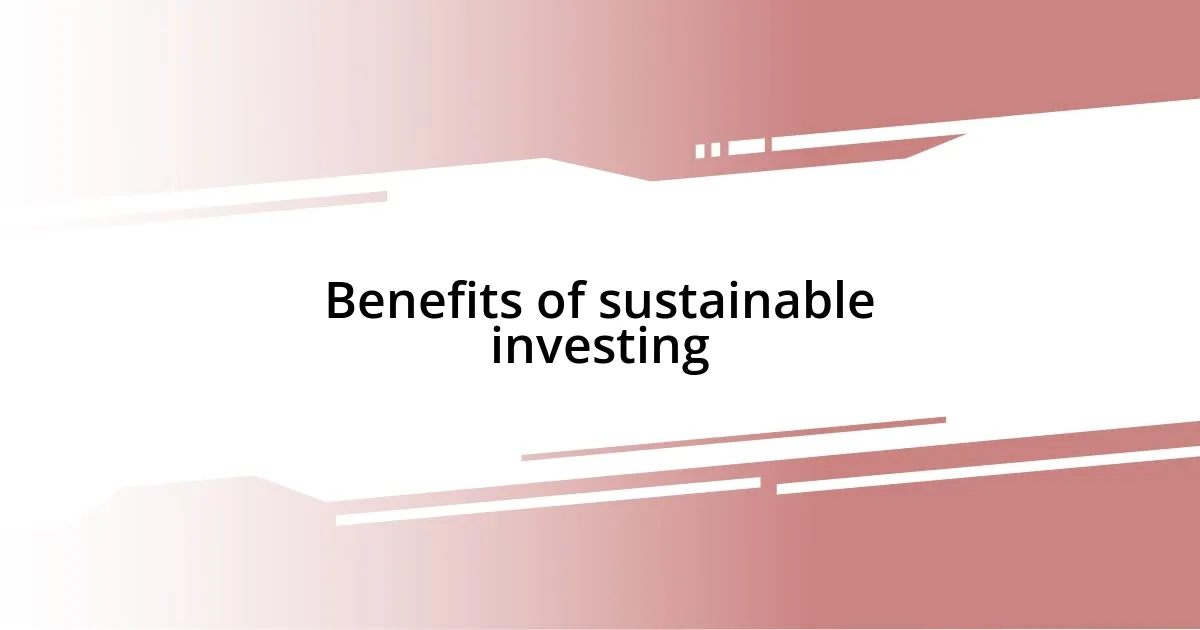
Benefits of sustainable investing
The benefits of sustainable investing extend beyond just financial returns. As I ventured deeper into this realm, I quickly discovered that companies with strong sustainability practices often have a better reputation, which can enhance their market value. For instance, I once invested in a firm known for its ethical sourcing, and over time, their commitment to sustainability translated into customer loyalty and increased sales. Isn’t it interesting how doing the right thing can result in a tangible financial win?
Moreover, sustainable investing encourages innovation and growth in sectors that are crucial for our future. When I think about the startups I’ve followed, many of them focus on clean technology and sustainable agriculture. Investing in these sectors not only aligns with my values but also positions me alongside companies that are reshaping industries for the better. I feel a sense of pride in supporting innovations that will significantly impact our planet.
Additionally, there’s a profound peace of mind that comes from knowing my portfolio is aligned with my ethics. I remember a moment of relief when I divested from a controversial fossil fuel company. The clarity and satisfaction I felt from that decision confirmed my belief in investing as a force for good. It’s empowering to think that I can contribute to a sustainable future while aiming for solid returns.
| Benefit | Description |
|---|---|
| Enhanced Reputation | Companies with strong ESG practices often enjoy better brand loyalty and customer trust. |
| Sector Growth | Investing in sustainable sectors fosters innovation and aligns with emerging market trends. |
| Ethical Alignment | Investors gain peace of mind knowing they support ethically responsible companies. |
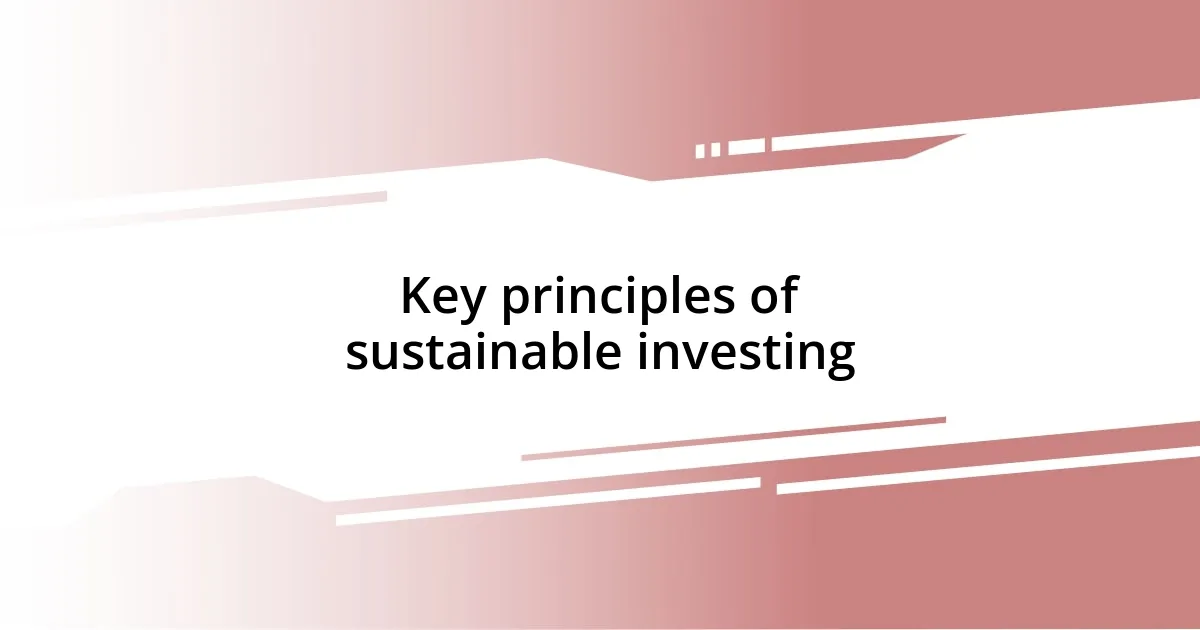
Key principles of sustainable investing
Sustainable investing is grounded in a set of core principles that guide how investors like me approach opportunities. One key principle is the integration of environmental, social, and governance (ESG) factors into investment decision-making. Reflecting on my own experiences, I remember how enlightening it was to dive into a company’s ESG reports. It wasn’t just about the numbers anymore; I could gauge their commitment to sustainability. Those reports often revealed the heart of a company – how they treat their employees, manage their resources, and engage with the community. This holistic view helped me feel more connected to my investments.
Another important principle is transparency and accountability. I’ve always found that companies which openly share their sustainability initiatives tend to inspire more trust. For example, I invested in a firm that not only shared annual sustainability reports but also set clear goals for reducing carbon emissions. Following their journey became a personal commitment for me, almost like rooting for a team. Understanding the efforts they were making and watching their progress reinforced my belief that accountability drives meaningful change.
- Integration of ESG Factors: Incorporating environmental, social, and governance metrics into decision-making.
- Transparency and Accountability: Companies that openly share sustainability goals foster investor trust.
- Long-Term Focus: Sustainable investing emphasizes long-term value over quick profits.
- Active Engagement: Investors are encouraged to engage with companies on sustainability issues for better outcomes.
- Community Impact: Prioritizing investments that positively impact communities aligns financial goals with ethical practices.
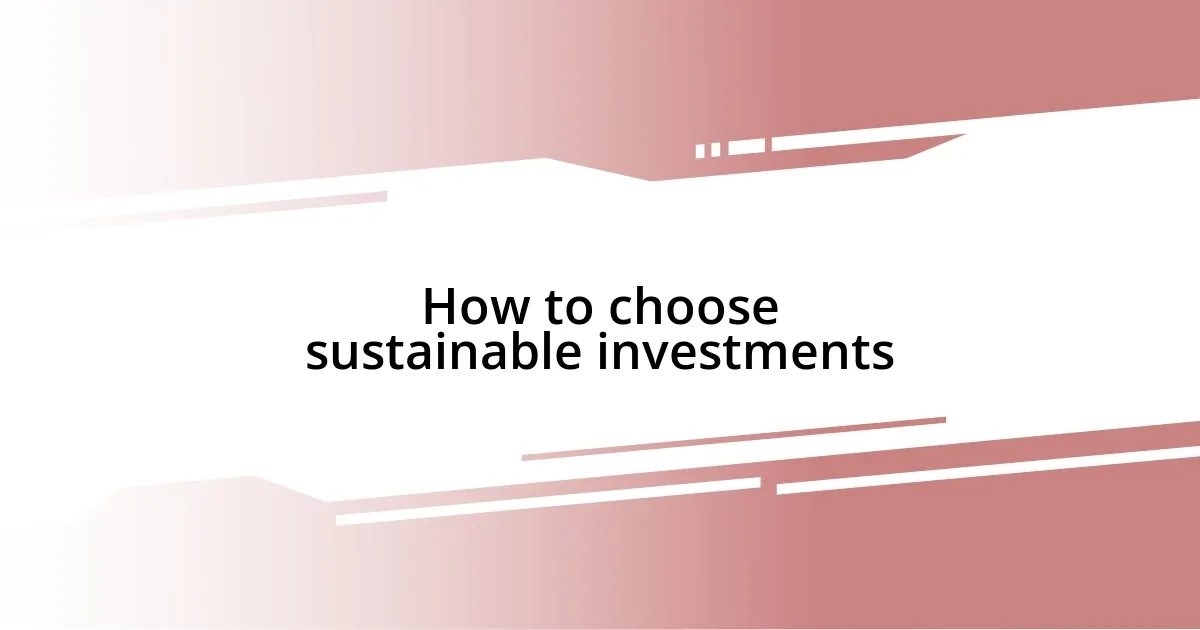
How to choose sustainable investments
Choosing sustainable investments can seem daunting at first, but with a little guidance, it becomes a rewarding journey. Start by researching companies that actively showcase their ESG practices. I remember stumbling upon a tech company dedicated to zero waste in its manufacturing process. Their commitment wasn’t just a marketing ploy—it was embedded in their operations, and it got me excited about the potential of my investment.
Next, consider the long-term impact of your investments. While it’s tempting to chase quick returns, sustainable investing is about fostering lasting change. I found that the companies with a solid sustainability roadmap often offered resilience during market fluctuations. Have you noticed how some stocks can seem volatile, while others steadily grow? That’s the beauty of investing in firms prioritizing sustainability—they’re focused on building a better future.
Lastly, don’t hesitate to engage with the companies you’re investing in. I’ve had enlightening conversations with shareholder relations teams, where they enthusiastically shared their latest sustainability initiatives. It made me feel like part of a larger movement, and I realized that staying informed not only enhances my investment knowledge but also reinforces my commitment to ethical practices. Isn’t it empowering to know that our voices matter in shaping the companies we invest in?
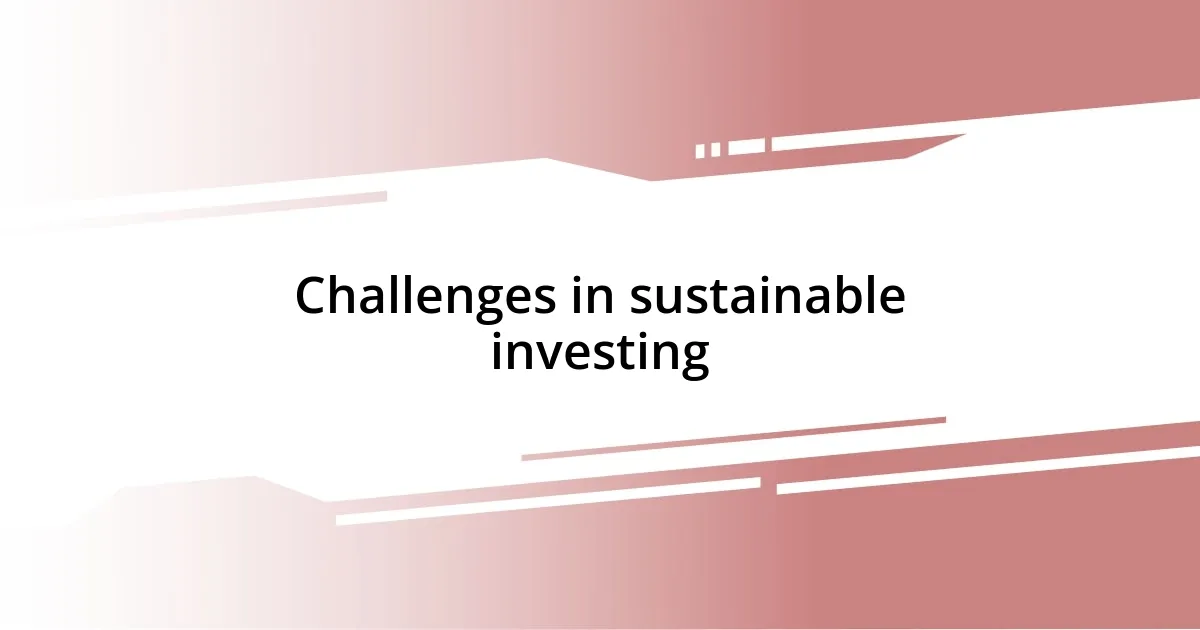
Challenges in sustainable investing
Sustainable investing presents its fair share of challenges, and one that stands out is the lack of standardized metrics to evaluate ESG performance. I often find myself sifting through different frameworks and ratings, trying to decipher which company truly prioritizes sustainability. It can feel frustrating, almost like trying to compare apples to oranges when the benchmarks are so varied.
Another significant hurdle is the risk of greenwashing, where companies claim to be sustainable without substantial proof. I remember being drawn to a brand that marketed itself as eco-friendly, only to discover later that their practices didn’t align with their promises. It’s an unsettling realization, but it highlights the importance of diligence and scrutiny in our investment choices. How do we ensure our investments actually align with our values? This inquiry drives me to dig deeper into companies’ practices, seeking transparency in their initiatives before committing my funds.
Moreover, the focus on short-term gains in the financial market often clashes with the long-term vision of sustainable investing. I feel the pressure to deliver quick returns, much like many investors around me. Yet, I know from experience that meaningful change takes time. I often wonder, how can we shift the narrative around profitability in investing? For me, it’s about staying invested in companies committed to lasting impact, which requires patience and an unwavering belief in the importance of sustainability.
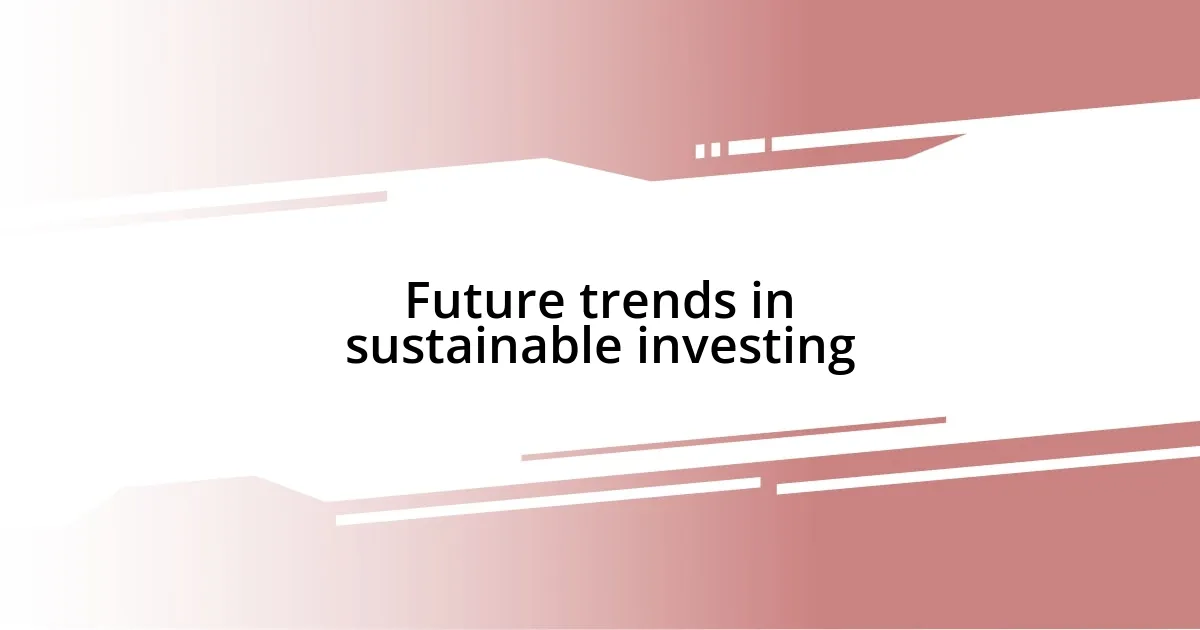
Future trends in sustainable investing
The future of sustainable investing is increasingly leaning toward technology-driven solutions. I’ve noticed a growing number of fintech companies developing platforms that provide real-time ESG analytics, which is quite exciting! Imagine having the ability to see the immediate impact of your investments at your fingertips—how empowering would that be? This accessibility can transform how we choose where to put our money.
Moreover, the integration of artificial intelligence in sustainability metrics is on the rise. I remember attending a conference where a tech entrepreneur shared how AI can predict a company’s future sustainability performance based on historical data. The potential of leveraging this technology to minimize risks and maximize positive outcomes resonates deeply with me. Can you envision a world where our investments are not only profitable but also pivotal in driving systemic changes?
Socially responsible investment funds are also gaining traction, reflecting a shift in investor sentiment toward inclusivity and diversity. I can’t help but feel a sense of responsibility as a shareholder in funds focusing on underrepresented communities. It’s more than just growing wealth; it’s about fostering a society where everyone has a chance to thrive. Isn’t it inspiring to think that our investment choices could play a role in creating a more equitable future? This evolution in sustainable investing fills me with hope for what lies ahead.












